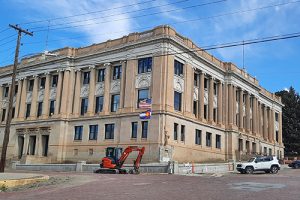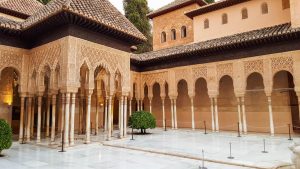by Carol Dunn
LA VETA-About 50 people attended the second public information meeting of the Transmission Line Coalition (TLC), held in La Veta on January 11. Deb Lathrop explained to the audience that, in the current Tri-State proposal to build a 95-mile energy transmission line from Alamosa to Walsenburg, “TLC felt that we did not have enough public input.” TLC combines landowners and interested people from towns and counties on both sides of La Veta Pass. Referring to Louis Bacon of Trinchera Ranch, she added, “We each count as a single citizen vote, just as Mr. Bacon does.” She added, “We want more questions asked. We do want more input.”
Guest speaker Dan Pike has worked on conservation easements for 30 years. He is currently the president of Colorado Open Lands. “I’m not in the transmission business,” Pike told the audience. He said he became interested in Tri-State’s proposed power transmission line when he reviewed the reports. “All the decisions were based on engineering and costs. I’m not sure environment was mentioned once in those reports,” he said. Colorado Open Lands became an intervener in the project proposal when it was determined that 21 conservation easements are found within Tri-State’s 500,000-acre study area. Referring to the report, Pike said, “It was very analytical about engineering and costs, but silent about everything else.”
Pike said the transmission line decision making process involves a plethora of issues: energy, national security, financial costs, environmental costs, land use, national vs. state vs. local priorities, and individual projects vs. cumulative impact. “We need a collective process that everybody agrees with.” Pike suggested that an information gathering model like that of NEPA (the National Environmental Policy Act) may be the way to make those decisions. He explained that NEPA investigates the impacts of transmission lines and decides what the options are. “The NEPA model is a good model to use. It requires adequate information,” Pike summarized.
Carol Overland, attorney and author of the book, “Transmission Lies,” has worked 15 years in transmission opposition advocacy. Overland explained that today’s utilities are a market-based system with nationwide implications and that utilities are profit driven to move power where they can sell it. Overland maintains that the demand for electricity in the West has steadily decreased since 2006 back to 2004 levels. Using Minnesota as an example, Overland explained how transmission line projects may be characterized as having a renewable energy focus, even though they are actually targeting coal power. “The transmission line will serve what’s there. If there’s coal there, they’ll serve the coal plant,” she explained.




